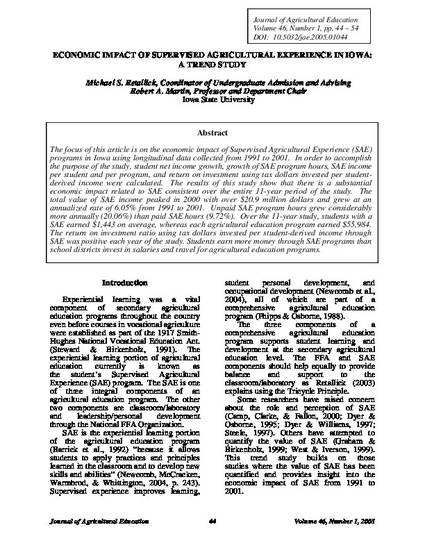
Article
Economic Impact of Supervised Agricultural Experience in Iowa: A Trend Study
Journal of Agricultural Education
Document Type
Article
Disciplines
Publication Version
Published Version
Publication Date
1-1-2005
DOI
10.5032/jae.2005.01044
Abstract
The focus of this article is on the economic impact of Supervised Agricultural Experience (SAE) programs in Iowa using longitudinal data collected from 1991 to 2001. In order to accomplish the purpose of the study, student net income growth, growth of SAE program hours, SAE income per student and per program, and return on investment using tax dollars invested per student-derived income were calculated. The results of this study show that there is a substantial economic impact related to SAE consistent over the entire 11-year period of the study. The total value of SAE income peaked in 2000 with over $20.9 million dollars and grew at an annualized rate of 6.05% from 1991 to 2001. Unpaid SAE program hours grew considerably more annually (20.06%) than paid SAE hours (9.72%). Over the 11-year study, students with a SAE earned $1,443 on average, whereas each agricultural education program earned $55,984. The return on investment ratio using tax dollars invested per student-derived income through SAE was positive each year of the study. Students earn more money through SAE programs than school districts invest in salaries and travel for agricultural education programs.
Copyright Owner
Journal of Agricultural Education
Copyright Date
2005
Language
en
File Format
application/pdf
Citation Information
Michael S. Retallick and Robert Martin. "Economic Impact of Supervised Agricultural Experience in Iowa: A Trend Study" Journal of Agricultural Education Vol. 46 Iss. 1 (2005) p. 44 - 54 Available at: http://works.bepress.com/michael-retallick/6/

This article is from Journal of Agricultural Education 46 (2005): 44, doi:10.5032/jae.2005.01044. Posted with permission.